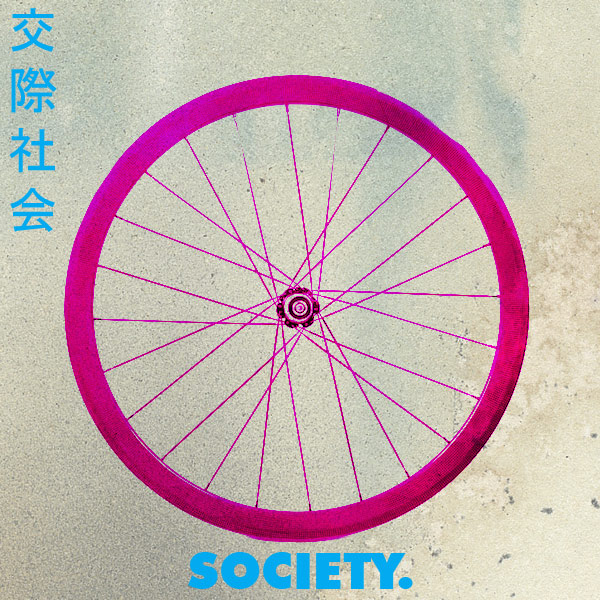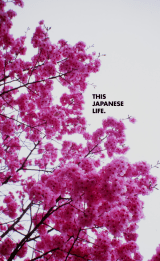The happiest expats in Japan often seem to be, if not the dumbest, then at least the most blithely unaffected by their surroundings.
People who make no effort to understand the logic of the mercies they’re controlled by are much more comfortable than those with the bane of curiosity. The name of your actual puppetmaster alone can take a year to sort out.
People who study Japan call the structure “hierarchical,” which is true, but it’s not one guy at each step, it’s groups. It’s a stack of bicycle tires. You have to integrate vertically, but you also have to integrate horizontally.
 Picture this: At every level in the stack, relationships extend out from the center to a circle of equals – the spokes hold up and support the hub, all of whom have a say in most decisions. The sun at the center, radiating outward. That’s how Japan works.
Picture this: At every level in the stack, relationships extend out from the center to a circle of equals – the spokes hold up and support the hub, all of whom have a say in most decisions. The sun at the center, radiating outward. That’s how Japan works.
When you arrive in a Japanese office, you aren’t the center, you’re not the spoke. You’re a stray piece of metal that has to jam its way in. Only after integrating on the X axis can you hope to start climbing the y.
The Onibaba Theory
If it helps, imagine that you, a 21st-century Westerner, find yourself outside of a 16th century Feudal Japanese rice-farming village. You would never be taken directly to the Daimyo (the leader of the fief). If the samurai didn’t immediately kill you (he would) you’d be placed somewhere close to dogs and criminals in the command line of the rice operation.
If you got in with a merchant – the lowest rung in Japan’s production-centric economy – you would have very specific rules about speaking to peasants, and samurai. Your position in the horizontal sphere would be low. But you’d also have to work on your place vertically – making sure the other merchants trust you, you weren’t cocky, etc. Otherwise, you might get run out of merchantdom by your peers.
On the other hand, the craftsmen, peasants, fishermen and samurai would always think you were scum, so you had to be careful of how you interacted with them on the vertical level.
In and Out
There are two central categories in Japan: The inside (uchi) and the outside (soto). These divisions are taken just as seriously as “up” and “down” in a hierarchy, but “up” and “down” are still handled as “in” or “out.” The samurai don’t see you as “lower” then them, in Western parlance, they think you as “outside” of them, then they find out what position you are in, and where that position falls, hierarchically.
An entire “alphabet” was invented for handling “outside” words from foreign lands – katakana. The rules of inside and outside are used for people, too. And they decide how you talk and how you are talked to.
When talking to outsiders whose status you are unaware of, you use polite language. Only when speaking to equals can you use more casual language. So when someone sees you as an outsider, they’ll be remarkably polite. Your chopstick skills will astound them.
The polite language of Japanese textbooks emphasizes formality and humility. This means being polite to strangers, but also confirms that the people I talk to are outside of my circle, and that I am outside of theirs: “I’m being polite, I am a foreigner” easily becomes “I’m being polite because I am a foreigner.”
The Japanese return the favor. They compliment my Japanese and my use of chopsticks, things a foreigner shouldn’t be able to do, even as badly as I do them. It’s also a linguistics thing. They use formal language to say, “Hey, you’re over there and I’m in here.”
Being outside of the circle, I’m supposed to try to work my way in. I should approach people and asked questions. After all, the wheel is working – it spins fast enough that there’s no easy entrance point. If I wanted to be part of that circle, I’d have to stick my hand into the spinning wheel for a second.
Motivational Factors
Keen to be accepted, I’d eventually crafted a Japanese persona at work – humble, self-effacing, always accepting the consensus opinion and doing what was asked when it was asked. This approach has limits, because I’m not remotely Japanese.
It backfired. By pretending to understand the Japanese way of doing things, and doing a convincing job of taking everything they threw at me, I started being held to Japanese standards in ways that other expats, who made no effort in masking their cultural differences, weren’t.
Once you’re in, you can’t get out.
Swaddled
“It has been decided,” I was told one day, “that you will stay after school to help the students prepare for the university interview tests.”
I was annoyed. I hadn’t been asked to give this bit of overtime, and no compensation seemed to be forthcoming. I asked myself, “If they had asked me, would I say no?” The answer was that I would have said yes, so I let it be.
Slowly, all the tasks I had been asked to do started becoming tasks that other teachers had decided I would do. There was never a question of what I wanted or was willing to do, or what my plans were.
I decided this was a translation error, a way of “being direct” that Japanese speakers of English are notoriously clumsy or hesitant about. But what had actually happened was, I’d been here long enough to break into the circle. The furthest spoke on the lowest wheel, sure, but just enough that I was being treated without the formal distance typically reserved for outsiders.
Speaking English
American English – more so than the other Englishes – is rooted in democratic ideals of equality. The small tics and mannerisms of Americans are usually rooted in getting the two speakers on the same level (often misinterpreted as insincerity, or over-enthusiasm).
Japan doesn’t have this tradition of egalitarianism, it has serfdom, so the language reinforces the status of the speaker. For a dime-a-dozen ALT in Japan, that status is very low.
Once I got past the foreign-treatment barrier, I was constantly reminded of that status and subject to its rules. I no longer merited the courtesy of being asked politely: It has been decided that my needs were secondary to the group’s needs. This is what it means to be part of the team.
I was in.
The Mediocracy
My competency at work seems to spawn a sharp decline in the courtesy I’m extended. As you get closer to the center of the circle, the conversation becomes less buried under layers of polite language. People become more casual and (again, at worst) more demanding. If you’re one of us, you’d better do the work.
This forms the basis of that old Japanese adage, “the nail that sticks up gets beaten down,” and serves to regulate any arrogance on behalf of a team member who might threaten the group harmony.
Get good enough at something to be useful, and you will soon find yourself under attack for those skills. The Japanese, at their worst, are like seagulls eyeing your french fries. Do your best to hide whatever you’ve got, or they’ll flock together and pick you apart.
It’s something of a cliche in the Japanese literature, but: Individual needs are secondary to the group consensus. Expressing a desire requires a lot of social finesse, and is extremely stressful – even as a foreigner, my entire day is ruined if I have to fight a Japanese co-worker on a contentious point. Not because I’m worried about offending them, but because I know the mechanisms of getting something fixed are a gigantic pain in the ass, and it’s rarely worth the social cost of switching the correction machinery on.
Here, individualism can only put you at odds with the group that you seek to belong to. The Japanese actually avoid saying “you,” or someone’s name, out of fear of making “you” uncomfortable by being acknowledged as an independent entity. This explains the grating frequency with which I am referred to as “the foreigner.”
So making decisions for others by consensus is sometimes considered a kind of relief. The consensus decides what your role is, and typically, you agree to it, because that’s just how things go.
“It has been decided that we Japanese will make this decision for you.”
The rest of us have talked and come to the decision that you will follow “This Japanese Life” on Facebook.






New arrivals get to use the gaijin card, a free pass for all kinds of bad behavior. If you stay long enough, though, there comes a day when you are expected to know better. That marks the gaijin’s admission as a member of the group. That only means that you now have a status, and are no longer just an interloper who is not part of the system.
Thank you, interesting read giving a bit more insight on the working situation ..
Yes, I know that feeling so well. That moment when you become “one of the group” and stop being “that one there.” At first (when I first entered into Japanese society, via my Japanese step-mother) I was treated as the outsider and then became “the pet.” Then, as I got older (especially after my 20th birthday — at least when everyone acknowledged I was over-20 and no longer a college student) everyone seemed to buckle down. I was no longer the pet, but a young adult who had to play even better with others, with no complaints, without being told what to do (I was supposed to know.) It was so frustrating! ((and I know I have it, even this way, easy because I still am given the grace of “well, she wasn’t born here…))
But you explain very well the differences between Japanese and western cultures. Thanks for putting words to these feelings.
Pingback: On Losing Your ID In Japan | This Japanese Life. | 生命を外面九天です
Pingback: On Inventing Yourself in Japan | This Japanese Life. | 生命を外面九天です
Pingback: On Driving a Train Off the Rails in Japan | This Japanese Life. | 生命を外面九天です
Pingback: Understanding Dr. Seuss in Japan | The Japanese Role Playing Game